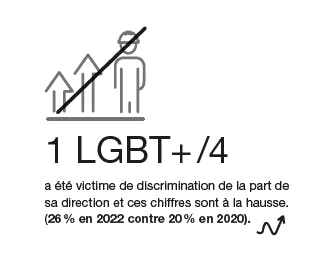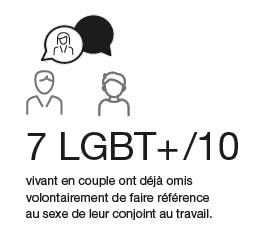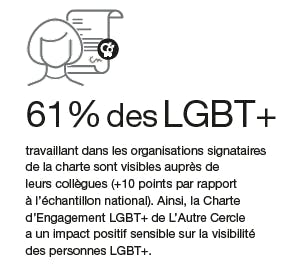They witness
- Alain Gavanddirector of the eponymous recruitment firm and vice-president of the association L’Autre Cercle.
- Delphine PouponneauDiversity and Inclusion Director of the Orange group
- Valerie Hallouinleader of the “We’R outStandInG Renault Group” employee network and LGBT+ role model at Renault
What does LGBTQ+ mean?
It is an acronym for different sexual orientations and gender identities:
- L for lesbian, G for gay, B for bisexual, T for transgender or transidentity, Q for queer.
- The “+” indicates a desire to include and not forget any other orientation and identity, in particular Q for “questioning” (questioning their sexuality), I for intersex (person born with particular sexual characteristics, and to whom one does not could assign a binary gender (male or female), A for asexual (having no sexual attraction), A for Androgynous (defining themselves somewhere between male and female), A for Allies (heterosexual allies of the cause) , pansexual (who claim attraction to any gender).
Climate degradation and rising “LGBTphobia”
In two years, the inclusion of LGBT+ people at work shows no positive evolution. This is the clear conclusion of the 3rd edition of the biennial LGBT+ barometer conducted by the association L’Autre Cercle in partnership with the IFOP*. The most pessimistic will even see in the results of this study a regression on the front of the inclusion of LGBT+ people.

It is extremely shocking that in 2022, in the land of freedoms that is France, a third of LGBT + people have still been the victim of at least one LGBTphobe attack within their organization.
Alain Gavand, director of the eponymous recruitment firm and vice-president of the association L’Autre Cercle
That is 4 points more than in 2020.
A deleterious climate that unfortunately goes hand in hand with an increase in the number of discriminations at the highest level of organizations. 26% of respondents, for example, denounce having been sidelined by their management, compared to 20% in 2020.

This climate is poorly perceived by non-LGBT+ people: only 34% have heard “LGBTphobic” remarks internally, compared to 55% of LGBT+ people.
Discriminations better identified
These results, Alain Gavand attributes them to a ” violence against LGBT + that invites itself in business as much as on social media “, he specifies.
For Valérie Hallouin, leader of the “We’R outStandInG Renault Group” employee network, this aggravation of “LGBT phobia” is also explained by the fact that situations of discrimination are now better identified.

In 2021, Renault appointed, internally, LGBT+ referents in order to break taboos related to sexual orientation. This initiative has led to a freeing of speech: the victims of discrimination, like the employees who witnessed it, have reported situations via the referents whereas until now, they did not report via our traditional channels.
Valérie Halloin, leader of the “We’R outStandInG Renault Group” employee network
In other words: there would not be more discrimination against LGBT+ people but the latter would be more visible, therefore mechanically more numerous, statistically speaking. “The tolerance of LGBT+ people is also less important. They no longer wish to resign themselves “says Alain Gavand.
One out of two LGBT+ is invisible in the workplace

In the eyes of LGBT+ people, invisibility is a bulwark against exclusion in the workplace. Results : one in two people do not reveal their sexual orientation. The problem is that this self-censorship harms their well-being at work. Thus, 4 LGBT + gave up participating in an informal event organized by colleagues where the spouses were invited, according to the study.

More surprisingly, this phenomenon is also visible within the 180 organizations that have signed the Charter of L’Autre Cercle, thus potentially ahead in terms of inclusion.

Among the invisible, 83% are, for example, to preserve their career development.
” The visibility of LGBT+ people at work has not improved for five years. We should start by not placing the issue of visibility on their shoulders alone. It is the responsibility of organizations to put in place a caring and inclusive environment, in which LGBT+ people allow themselves to be themselves “recalls Alain Gavand.

Thanks to all the initiatives that we carry out internally, but also to the roles of allies, who reframe deviant behavior, 70% of our LGBT+ employees are no longer afraid of being visible.
Delphine Pouponneau, Diversity and Inclusion Director of the Orange group.
A cause that tires company employees?
For several years, companies – mainly large groups – have been speaking out on the subject of inclusion. By wanting to communicate too much, some wear out their employees. All the more so when the networks of ambassadors border on communitarianism. ” This is a trend we are seeing internally. However, we must intervene to restore internal equity so that everyone benefits from the same opportunities. “, explains Delphine Pouponneau.
An opinion shared by Valérie Hallouin. ” In an ideal world, we wouldn’t have to talk about this subject because LGBT+ people wouldn’t be victims of insults, attacks or caricatural remarks. But in the meantime, anything that deviates from the norm is still greeted with modesty. We must therefore continue to raise awareness, even if there is a “diversity fatigue” that is expressed internally. »
The problem is that companies wishing to work towards inclusion take each of the 25 discrimination criteria one after the other. Ten years ago, they multiplied initiatives to promote the inclusion of disabled workers. Then, gender equality took over before giving way to the LGBT+ cause. “Inclusion deserves specific actions according to each theme. It is still difficult to address the subject in a global way, unless we tend towards labeling”, concludes Alain Gavand.
How to recognize an “LGBT-friendly” company?
- It has articulated its employer brand around diversity and inclusion
- It has an internal network of LGBT+ ambassadors
- She signed L’Autre Cercle’s LGBT+ commitment charter
- She has, among her collaborators, LGBT+ role models and allies
- It has appointed internal diversity referents
- It has the Diversity Label created by the State and issued by AFNOR
- It celebrates Pride Month in June
*Methodology: study carried out by the IFOP from April 22 to May 25, 2021 among 1,068 LGBT+ employees then from January 24 to February 11, 2022 among 29,979 employees working in organizations that have signed the L’Autre Cercle Charter.





